In Wisconsin, there is not enough alcohol regulation coming from the state level, so it is up to municipalities to make stabs at binge drinking within the state, the coordinator of the Wisconsin Alcohol Policy Project said.
On March 1, Julia Sherman, coordinator of the Wisconsin Alcohol Policy Project, spoke at the 2012 Bridge Summit in the Alumni Room of Davies Center at the University of Wisconsin-Eau Claire.
The event was hosted by The Bridge Campus-Community Coalition, a partnership between UW-Eau Claire and the greater Eau Claire community. The partnership seeks to address and reduce underage and high-risk drinking behaviors and associated negative experiences through education, enforcement and environmental changes.
Sherman’s speech focused on what local government can do to help end high-risk drinking behaviors.
“It takes public will and people willing to stick with it and work it through,” Sherman said.
Wisconsin doesn’t have an alcohol beverages control board, so for more regulation to happen, it will have to come from municipalities, Sherman said.
“Here in Wisconsin, it’s local,” Sherman said. “We don’t have anyone down in Madison saying what you can and what you can’t stock on your shelves. You can make your decisions by local people for the benefit of local people and that is a gift. But it’s also a well rested muscle in Wisconsin.”
She said that to help counter binge drinking in Wisconsin and the negative affects that come with, there are four things that can be done to make alcohol less appealing: make it less acceptable, make it less available, make it less attractive or make it less affordable.
Sherman said that while changing how affordable alcohol is at a local level is difficult, the other three are certainly doable. And in a state with binge drinking rates as high as they are in Wisconsin, the context, or the environment, is telling people it’s OK to drink to excess.
“Municipalities have the ability and the authority to improve the alcohol environment in their area. It really comes down to that as a group, your community can come together and make significant changes in the alcohol environment.”
Here are some of the ways Sherman said municipalities can utilize to help change their alcohol environments:
1) Limit bars in one particular area. She said that this is of particular concern in college towns where bars tend to be located in one or two areas that are almost always within two miles of campus, such as Eau Claire’s Water Street. Limiting alcohol licenses can help.
Once alcohol licences are awarded, however, Sherman says they are difficult to retrieve.
2) Have sober servers in bars. The ACE recommends that the BAC of servers in bars is limited to .04 while on duty. Impaired servers may check IDs less often or may over-serve bar patrons, Sherman said.
3) Ban drink specials. Drink specials, especially those with a time limit or all-you-can-drink specials can easily lead to binge drinking, Sherman said. Municipalities can create ordinances banning such specials.
4) Social host ordinances to prevent under aged drinking. These ordinances make it illegal for people to host or allow a gathering that will serve people under the age of 21. The host doesn’t have to be present at the gathering to be responsible. Several Wisconsin municipalities have passed them, including Kenosha, Fond du Lac and Wausau.
5) Public intoxication ordinances.
La Crosse and Menomonie both have public intoxication ordinances, which are in place mostly for the safety of people who have drank too much and to prevent immediate harm, Sherman said. La Crosse’s ordinance was adopted in 2004 and was focused initially around people falling into the river. Menomonie adopted theirs in 2011 to protect vulnerable people from harm such as sexual assault, Sherman said.
UW-Eau Claire Police Department Officer Joe Fields attended the presentation and said that he sees problems when people drink alcohol.
“They drink until they can’t take care of themselves so then it affects other people because now their friends are trying to help this person get home,” he said. “But then they’re struggling themselves because they’ve been consuming so that small problem of one person thinking it just affects themselves goes out further.”
City Council member Dave Duax attended Sherman’s presentation and said that her ideas got him thinking about what Eau Claire can do to prevent problems that stem
from alcohol.
“Each city, and Eau Claire is no different, is going to have to sit down and decide which of these issues, the acceptability, the availability, the attractiveness and the affordability of alcohol, are things we can deal with.” Daux said.
One problem that Duax said he’s noticed is the amount of effort that goes into policing the Water Street area.
“It’s about the authority that municipalities do have to address what ever problems we have with alcohol licensing,” Duax said.
Another issue that he said he would like to see looked into is that of tightening up bar licenses the city issues and adding conditions to licenses they
issue hereafter.
Daux said Sherman offered the city many tools they can work with to implement change.
“These are ways that we can cut into that alcohol culture that really dominates.”








